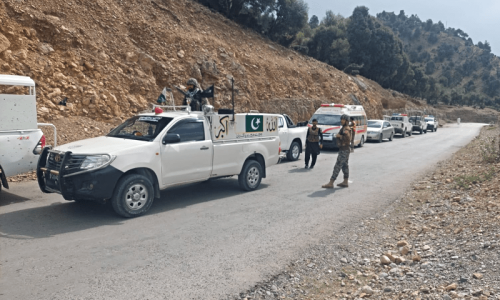Clad in pink attire and a traditional burqa, body of a young woman lying in a pool of blood in the hometown of Khyber Pakthunkhwa chief minister was attracting the passers-by. Officials of the concerned Nowshera Kalan police station said that the unidentified woman was brought in a car by unknown persons and shot in the head on Ziarat Kaka Sahib Road.
Mystery shrouds the incident with the police suspecting that it might be a case of honour-related killing. After autopsy, the deceased was buried at Kaka Sahib Graveyard. The incident took place on Feb 8 and the police have yet to trace identity of the deceased.
An official at the police station said that as the policemen had been outstretched because of duties of VIPs and ongoing anti-polio campaign, they had no time left to deal with day-to-day crimes. “The anti-polio campaign is from Feb 6 to 15 in Nowshera district and almost all the officials have been assigned duties in it.”
He said that despite this they had been trying to identify the deceased following which it would be easier to ascertain the motive behind her murder. The recent spate in cases of violence against women in Khyber Pakhtunkhwa has resulted into a public outcry.
On Feb 1, officials of Daudzai police station in Peshawar recovered two unidentified bodies of women from the Kabul River. Their killers could not be traced.
The killing of a woman NGO worker in Ustarzai, Kohat, was also highlighted by media. Her sister, Farheen, who is complainant in the case, claimed that their cousin, Mehboob Alam, had killed her sister. She alleged that the suspect was asking his cousin to quit her NGO job, arguing it had been bringing a bad name to the family and on her refusal, he fired four shots at her which resulted in her death on Feb 6.
While the civil society activists were busy in highlighting those incidents, they received a report of unnatural death of another young woman in the jurisdiction of Akora Khattak police station in Nowshera. Hameedul Haq, father of the deceased woman, lodged a complaint with police on Feb 10 wherein he alleged that his daughter was poisoned to death by her husband, Wajid Mehmood, and in-laws. He claimed that she was married to Mehmood over a year ago and was a victim of domestic violence.
The stories of the survivors of violence are as miserable as that of those who have fallen prey to it. Haleema Bibi, a mother of three, had remained with an abusive husband for seven years since her marriage in 2007.
In 2014, she was attacked by her husband, Naeem, and two of his relatives. She had received six bullet shots, but survived that attack. In the meantime, she was also divorced. As she had to regularly visit local court to pursue the case as well as another case in family court, she was again attacked on Jan 23, 2017. She received three bullet shots and had to remain hospitalised for 10 days.
Due to lack of any protection by the government two of her children, who are of schoolgoing age, have to remain without education as she feared that they would be kidnapped by Naeem and would be sold out as he was a gambler. “I will no longer pursue cases in the court as I will be attacked again,” she said.
“These cases are happening in close succession and it has become difficult for us to keep pace with such occurrences,” said Taimoor Kamal, coordinator of KP Civil Society Network. He regretted that while the government has turned a blind eye to all these incidents it had now been presumed that it was the responsibility of civil society to raise voice in such incidents.
He recalled that on Jan 11 a mother of four children, Uzma Bibi, had expired at Pakistan Institute of Medical Sciences due to severe burn injuries. He said that she was put to torch by her in-laws after pouring petrol on her on Dec 18, 2016 in Nowshera district and after many painful days she died.
Eight persons, including her husband, and other in-laws were charged in that case. After many hearings the suspects were arrested as their pre-arrest bail petitions were dismissed by a court in Nowshera a few days ago.
“Khyber Pakhtunkhwa needs special legislation in line with Anti-Women Practices Act 2010, with proper implementation framework for the law to reduce the ratio of honor killing, rape, forced marriage and customary practices against women,” said Qamar Naseem, programme coordinator of Blue Veins, an organization dealing with vulnerable groups. He said that administrative machinery and statutory bodies needed to be strengthened in terms of capacity building for their effective functioning.
He said that the province lacked a comprehensive mechanism of victim protection. “We need to shift our strategies from temporary compensation to rehabilitation and reintegration of the survivors back into their communities.”
Recently, a research study was conducted by Blue Veins on women’s access to justice and effectiveness of pro-women laws in KP.
Advocate Kazim Jan, who conducted the study, said that he had analysed 14 pro-women laws enacted during last several years and it was found that mostly women were not aware of these laws.
“Despite existence of several pro-women laws there are other challenges which hinder speedy access to justice for women in the province. Lack of education, awareness and accountability, and outdated customs and governance issues are also impeding women from seeking justice through the existing legal framework,” he said.
Published in Dawn February 13th, 2017












































Dear visitor, the comments section is undergoing an overhaul and will return soon.